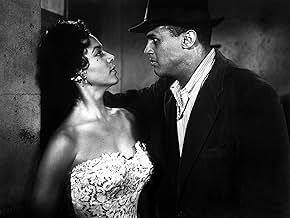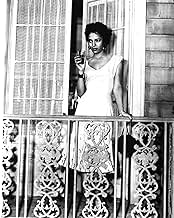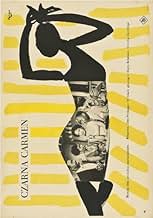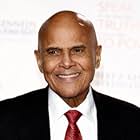Carmen Jones
- 1954
- Tous publics
- 1h 45min
NOTE IMDb
6,7/10
6,1 k
MA NOTE
Ajouter une intrigue dans votre langueContemporary version of the Bizet opera, with new lyrics and an African-American cast.Contemporary version of the Bizet opera, with new lyrics and an African-American cast.Contemporary version of the Bizet opera, with new lyrics and an African-American cast.
- Nommé pour 2 Oscars
- 5 victoires et 8 nominations au total
Brock Peters
- Sergeant Brown
- (as Broc Peters)
LeVern Hutcherson
- Joe
- (voix)
- (as Le Vern Hutcherson)
Marilyn Horne
- Carmen Jones
- (voix)
- (as Marilynn Horne)
Marvin Hayes
- Husky Miller
- (voix)
Alvin Ailey
- Dance Soloist
- (non crédité)
DeForest Covan
- Trainer
- (non crédité)
Joseph E. Crawford
- Dink Franklin
- (voix (chant))
- (non crédité)
Carmen De Lavallade
- Dance Soloist
- (non crédité)
Bernie Hamilton
- Reporter
- (non crédité)
Margaret Lancaster
- Singing Voice
- (non crédité)
Histoire
Le saviez-vous
- AnecdotesEartha Kitt was offered the role of Carmen, but the studio wanted her singing voice to be dubbed, so that her character would have an operatic voice. The same offer was made to Harry Belafonte and Diahann Carroll who accepted, but Kitt refused, wanting to use her natural voice. Dubbing was not required for Pearl Bailey, whose own voice suited her comedic songs.
- GaffesThe story takes place circa 1944, but all of the women's fashions and hairstyles are strictly 1954; when Carmen and Frankie are talking outside the Chicago Pawn Shop, 1950s-era automobiles passing by can clearly be seen reflected in the showcase window.
- Citations
Carmen Jones: I always did want to see the big town.
Frankie: You got your wish, honey. Somethin' tells me Chicago's gonna be real good for you.
Myrt: Somethin' tells me you gonna be real *bad* for Chicago.
- Crédits fousThe opening credits and end title are set around a flaming rose.
- ConnexionsFeatured in Small Steps, Big Strides: The Black Experience in Hollywood (1998)
Commentaire à la une
Carmen (1954)
First of all, this is a gorgeous movie. The WWII-era sets, the fluid photography with a lot of long takes, the lighting and costumes and overall feel are elegant and un-compromised, first frame to last.
Second, the idea is fabulous, an all-Black cast and an African-American adaptation of the classic Carmen opera (by the French composure Bizet). The vernacular and the stereotypes might seem worn, or even insulting if you take them wrong (or just take them out of context) but in fact it's in line with that even better, earlier opera, Gershwin's Porgy and Bess. The stereotypes are ones that made sanitized sense equally to White and Black America just as other musicals made sanitized sense to the same audiences. If I sound like an apologist, I'm only responding to attacks on the film ("farcical" "gruesome" or "dreadful"), as being untrue or insensitive to Blacks, by saying that nearly all musicals are incredibly stylized and false, and nearly all movies of this era played with safe, simplified versions of life.
No, to be fair to this really interesting movie you need to treat it like you would your own favorite movies from the 1950s, accepting the limitations just as the movie makers did. It's got its own syntax and style, it's own inner set of rules.
And within those the performance of the character Carmen by Dorothy Dandridge is incredible. She's on fire, introspective, nuanced, and outrageous. The cast around her is excellent but inevitably uneven, and she stands easily above them in pure performance energy, even over the other big star, Harry Belafonte.
All of this said, the beautiful, finely made, early widescreen movie here, "Carmen Jones," is lacking some kind of necessary intensity to work. I can't pin down why. From little strains of Bizet that perk it up (like a boxing worker whistling the most famous theme as he works) to the truly perfect photography and editing (maybe too perfect?), the movie has a steady, compelling flow. It's based on a Broadway musical from 1943 (the year the movie is set, as well), and it has the bones of a great drama, if a familiar one (it's still Bizet).
What might be the biggest problem is the understandable decision to film it in a realistic way, with song (and minimal dance) numbers inserted relatively seamlessly along the way. This is the standard musical approach from from the early Astaire-Rogers films to the relatively contemporaneous Arthur Freed productions of the early 1950s like "Singin' in the Rain." But Carmen, the opera and stage musical, is not a lighthearted romantic comedy. It isn't just escapist entertainment. And the gravitas and drama in it, at the end in particular, doesn't quite work the way it does on the opera stage. You watch Belafonte and Dandridge acting their hearts out, but it has that perfect 1950s movie-making production to remind us that it's a movie, and we are detached in a far different way than watching a stage version, with real people and false settings.
But never mind all that--you'll see for yourself how absorbed you get and why not more so.
A couple last things. First, the singing voices of the two leads are dubbed (yes!), surprising in Belafonte's case in particular because he was (and is) an accomplished singer. Second, Dandridge and director Preminger were having a longterm affair during the filming and after, and she pulls off what might be the best performance of her life here. Third, the movie was shown to the head of the NAACP before release to check on any problems that might be seen from an African-American point of view (this is 1954, remember) and no objections were raised. By this point, Preminger had been working with an all Black cast and was in close quarters with the leading lady so he must have had some sense that what he was after was on target for the time.
Watch it if you have interest in any of these things--WWII civilian life, Dandridge or Belafonte, opera adaptations into movies, early big budget African-American movies, Preminger movies, or terrific early Cinemascope photography. That should cover a lot of viewers, but not all. For me, I liked it a lot, and liked parts of it enormously (like the short clip of Max Roach drumming away on a barroom stage). But I felt slightly restless too often to get totally absorbed. One last suggestion--see it on the biggest screen you can, so it will be immersive.
First of all, this is a gorgeous movie. The WWII-era sets, the fluid photography with a lot of long takes, the lighting and costumes and overall feel are elegant and un-compromised, first frame to last.
Second, the idea is fabulous, an all-Black cast and an African-American adaptation of the classic Carmen opera (by the French composure Bizet). The vernacular and the stereotypes might seem worn, or even insulting if you take them wrong (or just take them out of context) but in fact it's in line with that even better, earlier opera, Gershwin's Porgy and Bess. The stereotypes are ones that made sanitized sense equally to White and Black America just as other musicals made sanitized sense to the same audiences. If I sound like an apologist, I'm only responding to attacks on the film ("farcical" "gruesome" or "dreadful"), as being untrue or insensitive to Blacks, by saying that nearly all musicals are incredibly stylized and false, and nearly all movies of this era played with safe, simplified versions of life.
No, to be fair to this really interesting movie you need to treat it like you would your own favorite movies from the 1950s, accepting the limitations just as the movie makers did. It's got its own syntax and style, it's own inner set of rules.
And within those the performance of the character Carmen by Dorothy Dandridge is incredible. She's on fire, introspective, nuanced, and outrageous. The cast around her is excellent but inevitably uneven, and she stands easily above them in pure performance energy, even over the other big star, Harry Belafonte.
All of this said, the beautiful, finely made, early widescreen movie here, "Carmen Jones," is lacking some kind of necessary intensity to work. I can't pin down why. From little strains of Bizet that perk it up (like a boxing worker whistling the most famous theme as he works) to the truly perfect photography and editing (maybe too perfect?), the movie has a steady, compelling flow. It's based on a Broadway musical from 1943 (the year the movie is set, as well), and it has the bones of a great drama, if a familiar one (it's still Bizet).
What might be the biggest problem is the understandable decision to film it in a realistic way, with song (and minimal dance) numbers inserted relatively seamlessly along the way. This is the standard musical approach from from the early Astaire-Rogers films to the relatively contemporaneous Arthur Freed productions of the early 1950s like "Singin' in the Rain." But Carmen, the opera and stage musical, is not a lighthearted romantic comedy. It isn't just escapist entertainment. And the gravitas and drama in it, at the end in particular, doesn't quite work the way it does on the opera stage. You watch Belafonte and Dandridge acting their hearts out, but it has that perfect 1950s movie-making production to remind us that it's a movie, and we are detached in a far different way than watching a stage version, with real people and false settings.
But never mind all that--you'll see for yourself how absorbed you get and why not more so.
A couple last things. First, the singing voices of the two leads are dubbed (yes!), surprising in Belafonte's case in particular because he was (and is) an accomplished singer. Second, Dandridge and director Preminger were having a longterm affair during the filming and after, and she pulls off what might be the best performance of her life here. Third, the movie was shown to the head of the NAACP before release to check on any problems that might be seen from an African-American point of view (this is 1954, remember) and no objections were raised. By this point, Preminger had been working with an all Black cast and was in close quarters with the leading lady so he must have had some sense that what he was after was on target for the time.
Watch it if you have interest in any of these things--WWII civilian life, Dandridge or Belafonte, opera adaptations into movies, early big budget African-American movies, Preminger movies, or terrific early Cinemascope photography. That should cover a lot of viewers, but not all. For me, I liked it a lot, and liked parts of it enormously (like the short clip of Max Roach drumming away on a barroom stage). But I felt slightly restless too often to get totally absorbed. One last suggestion--see it on the biggest screen you can, so it will be immersive.
- secondtake
- 17 sept. 2012
- Permalien
Meilleurs choix
Connectez-vous pour évaluer et suivre la liste de favoris afin de recevoir des recommandations personnalisées
- How long is Carmen Jones?Alimenté par Alexa
Détails
- Date de sortie
- Pays d’origine
- Langue
- Aussi connu sous le nom de
- Oscar Hammerstein's Carmen Jones
- Lieux de tournage
- Southern Pacific railroad crossing at 8746 E Los Angeles Avenue, aka California Highway 118, Moorpark, Californie, États-Unis(scene where Carmen attempts escape from the Jeep)
- Société de production
- Voir plus de crédits d'entreprise sur IMDbPro
Box-office
- Budget
- 750 000 $US (estimé)
- Durée1 heure 45 minutes
- Couleur
- Rapport de forme
- 2.55 : 1
Contribuer à cette page
Suggérer une modification ou ajouter du contenu manquant

Lacune principale
By what name was Carmen Jones (1954) officially released in India in English?
Répondre
































